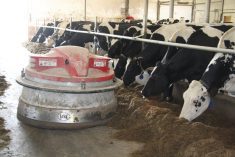GREAT FALLS, Mont. – Carrying a message of goodwill to the United States, the president of the Canadian National Farmers Union mended some fences at the Montana Farmers’ Union convention here.
With assurances she brought no grain or cattle with her to sell, Nettie Wiebe said farmers face the same challenges no matter where they live.
She told the Montana group, which represents 4,000 farm families, about the importance of preserving the family farm in North America in an age of globalization, world trade agreements and the formidable power of multinational trading companies.
Read Also

Manitoba extends Crown land rent freeze
Manitoba government links the continued rental rate freeze on grazing and forage leases to economic and environmental challenges facing the industry
Keep the borders
While she’s open to friendly relations, Wiebe doesn’t want the borders dissolved because she doubts the average farmer benefits from more open trade.
“To erase the border would be excellent for Cargill but not for me or you,” she told the farmers.
“When you erase the boundaries on a big playing field the only players who are really big enough to run the length of that field are transnational companies,” said Wiebe in a later interview.
Realizing the influx of Canadian grain is a major irritant to many farmers in Montana, she provided assurances that Canada doesn’t need to sell grain to the U.S. because prices elsewhere are good and quotas are open.
Wiebe said the National Farmers Union supports the Canadian Wheat Board export sales monopoly on wheat and barley and she criticized those who try to sell independently for the highest price and leave the lowest price for everyone else.
She said a continental wheat and barley market will not benefit American farmers and could result in helter skelter marketing into the U.S.
However, as long as U.S. elevator prices are higher, Canadians will continue to move large amounts of wheat and barley to the U.S., she said.















